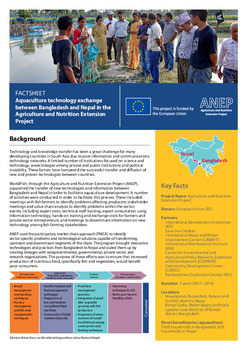Aquaculture technology exchange between Bangladesh and Nepal in the Agriculture and Nutrition Extension Project

Citation
WorldFish (2014). Aquaculture technology exchange between Bangladesh and Nepal in the Agriculture and Nutrition Extension Project. Penang, Malaysia. Factsheet: 2014-74
Technology and knowledge transfer has been a great challenge for many developing countries in South Asia due to poor information and communications technology networks. A limited number of institutions focused on science and technology, weak linkages among private and public institutions and political instability. These factors have hampered the successful transfer and diffusion of new and proven technologies between countries. WorldFish, through the Agriculture and Nutrition Extension Project (ANEP), supported the transfer of new technologies and information between Bangladesh and Nepal in order to facilitate aquaculture development. A number of activities were conducted in order to facilitate this process. These included: meetings with fish farmers to identify problems affecting producers; stakeholder meetings and value chain analysis to identify problems within the sector; events, including expert visits, technical staff training, expert consultation using information technology, hands-on training and exchange visits for farmers and private sector entrepreneurs; and meetings to disseminate information on new technology among fish farming stakeholders. ANEP used the participatory market chain approach (PMCA) to identify sector-specific problems and technological solutions capable of transforming upstream and downstream segments of the chain. The program brought innovative technologies and practices from Bangladesh to Nepal and scaled them up by creating linkages with nongovernmental, governmental, private sector and research organizations. The purpose of these efforts was to ensure that increased production of nutritious food, specifically fish and vegetables, would benefit poor consumers.
Permalink
Date Available
Type
Publisher
Countries
Copyright
CC BY 4.0
Research Themes